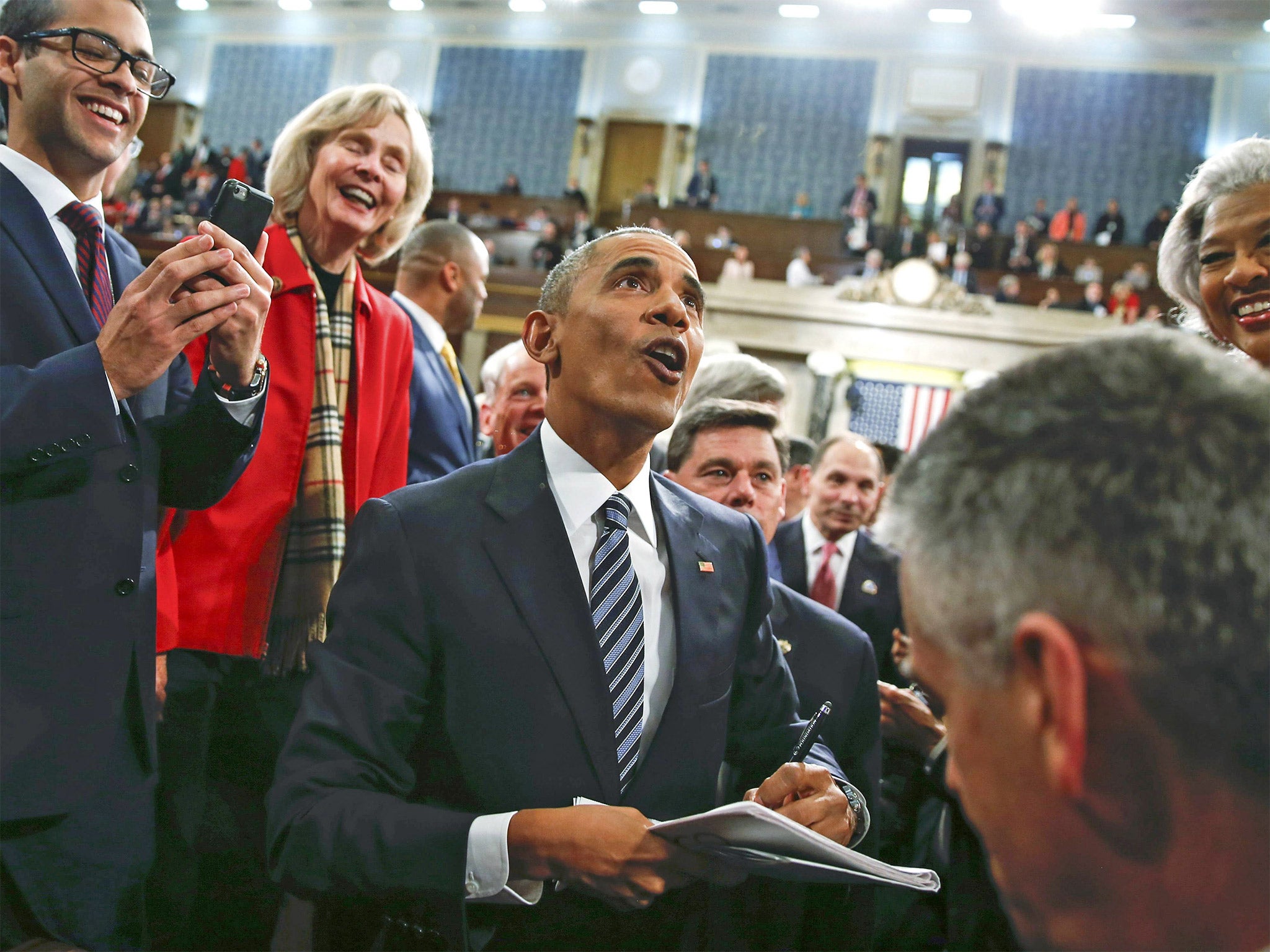State of the Union: President Obama breaks new ground with attack on America's ‘broken political system’
Too many safe seats, too much money: President uses his last address to go on the offensive

State of the Union addresses do not usually linger in the memory, but President Obama’s final one may prove the exception. Not only did he attempt to dispel the rancid pessimism that permeates the Republican presidential free-for-all. He dwelt as none of his predecessors upon America’s greatest present failing: its dysfunctional and broken political system.
Whether his relentless optimism on Tuesday evening will have any impact remain to be seen. Without naming them, Mr Obama took aim at the two most strident defeatists in the Republican field, Donald Trump and Ted Cruz, running first and second in every national poll.
America remained far and away the greatest power on earth, he assured. The president assailed Mr Trump for his proposed ban on Muslims entering the US and the “this is World War III” rhetoric that would only play into the hands of Isis – which he rightly declared, was not an existential threat to America.
Similarly he dismissed Mr Cruz call for carpet bombing of civilians to to destroy Isis. Fine as a campaign soundbite, he said, but one that “doesn’t pass muster” in the real world. The Texas senator hit back with another soundbite that probably echoes most Republican candidates’ view – “Not a State of the Union but a State of Denial.”
In fact, that would be the Republican take on pretty well everything else Mr Obama had to say in his 55-minute speech, in reviewing the improvements at home since he took office in 2009: economic recovery, the successes of American companies in the high tech field, the progress towards energy savings, and the reform (still bitterly fought by Republicans) of the US health care system.

Nor did he gloss over the challenges, from making college education more affordable to tackling climate change, from providing greater job security in an age of globalisation to allaying public resentment of the ever-growing disparities between rich and poor.
But no challenge was greater than overcoming American’s distrust of institutions, fuelled by partisan warfare that made agreement by Congress on anything of significance virtually impossible.
The reasons listed by Mr Obama have long been evident, but rarely has a president addressed them so directly in his great annual set-piece” the gerrymandering of Congressional districts, the excessive role of money in politics, and the constant efforts of many Republican-confrolled states to make it harder for people – especially blacks and minorities – to vote.
In part the problem has been his fault, in his all-too-evident disdain for Congress, and his inability to build strong personal relationships with its leaders. However while the animosity on Capitol Hill has grown worse since 2009, its causes long predate his presidency.
As gerrymandering, practised by Republican and Democratic state legislatures alike, has spread, so the number of safe districts has grown. Of the 435 Congressional seats, maybe 60 are genuinely competitive. The real threat to most incumbents lies in primaries dominated by activists, forcing Republican candidates ever further to the right. The result has been the Tea Party.
This must change, Mr Obama said, “We’ve got to end the practice of drawing our congressional districts so that politicians can pick their voters, and not the other way around.”
Next, the influence of money in politics must be reduced, so that “so that a handful of families or hidden interests can’t bankroll our elections.” If the courts wouldn’t do it, then a biaptisan reform effort was needed. And third, voting must be made simpler: “This is America: We want to make it easier for people to participate.” And until these changes happen, the “strong” state of the Union that Mr Obama proclaimed will remain in part a mirage.
Join our commenting forum
Join thought-provoking conversations, follow other Independent readers and see their replies
Comments
Bookmark popover
Removed from bookmarks